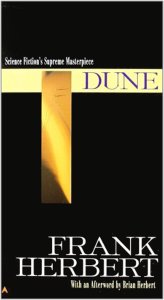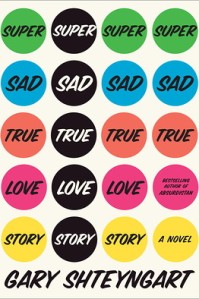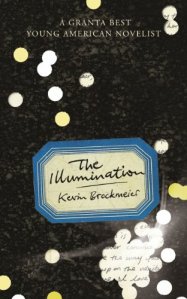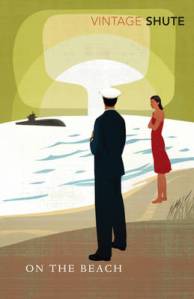 There was much interest in my post on Frank Herbert’s science fiction classic, Dune, probably because I asked the question, “How often should a water conservationist bathe?”
There was much interest in my post on Frank Herbert’s science fiction classic, Dune, probably because I asked the question, “How often should a water conservationist bathe?”
So here’s a little more background.
Dune was a groundbreaking ecological novel, originally published in 1965 by Chilton Books, a press known for auto repair manuals. (it was rejected everywhere else, according to the afterword of my paperback.) Herbert, a journalist, got the idea for the novel while researching a magazine article on a government project in Oregon. The U.S. Department of Agriculture planted “poverty grasses” (which grow in sandy soil) on the crests of dunes to stop the drifting of sand on to the highways.
Fascinated by the idea that the change of an ecosystem could green a planet, he wrote Dune.
Set on a desert planet, this SF classic focuses on the paucity of water and the exploitation of a planet’s resources for the mining of a valuable, addictive spice called Melange. The rich live luxuriously, with access to all the water they want, while the native Fremen survive by wearing “stillsuits” that recycle every drop of moisture, from sweat to urine. A radical planetologist, Kynes, plots a scientific system that several centuries on will green the planet. But after the assassination of the sympathetic Duke Atreides, Kynes, too, is killed. The duke’s priestess-witch concubine Jessica and psychic son Paul flee to the desert, where Paul becomes a T. E. Lawrence-style leader and champion of ecology and the Fremen culture.
Frank Herbert’s son, Brian Herbert writes in the Afterword that Dune sold slowly in the ’60s but eventually became a best-seller. It received a good review in The New York Times and was promoted in The Whole Earth Catalogue.
He writes,
By the early 1970s, sales of Dune began to accelerate, largely because the novel was heralded as an environmental handbook, warning about the dangers of destroying the Earth’s finite resources. Frank Herbert spoke to more than 30,000 people at the first Earth Day in Philadelphia, and he toured the country, speaking to enthusiastic college audiences. The environmental movement was sweeping the nation, and Dad rode the crest of the wave, a breathtaking trip. When he published Children of Dune in 1976, it became a runaway bestseller, hitting every important list in the country.
It is easy to see why this hit a nerve in the ’70s. In my hometown, we read The Environmental Handbook and The Population Bomb (two books still pertinent today). The professor/political activist family I lived with for a few months in high school recommended Dune. They were very aware of the advertising culture (soaps, detergents, deodorants, makeup) that defined American lives and made us heartily dislike our bodies. They showered only a couple of times a week, while I admired their philosophy but continued to shower daily and washed my hair at least twice a week. “You’re the cleanest person we know,” they teased.
But if my use of water was high in those days, imagine how it increased over the next decades. By the ’80s, I washed my hair every other day. In the ’90s, I washed my hair daily. It is only in recent years that I have rethought this and bathe according to my activity level. (Today I rode into a fierce wind that whipped my hair into my eyes and my bike chain fell off twice, so I came home with filthy hair and hands covered with grease. Thank God for water!)
In answer to yesterday’s question, “How often should a water conservationist bathe?”, two commenters mentioned that they do not wash their hair everyday, because it is not good for it, while another says she washes it daily and considers it her water therapy. (I find it relaxing to sit in a hot bath, which is even more taboo than showers in terms of water usage.) In an article in Buzzfeed, “How Often You Really Need to Shower (According to Science)?”, two dermatologists said that showering too often can dry out and irritate skin and wash away the good bacteria that naturally exists on your skin. Dr. Ranella Hirsch, a Boston dermatologist, said, “We overbathe in this country and that’s really important to realize. A lot of the reason we do it is because of societal norms.”
Yes, we want very much not to smell our bodies. Isn’t it wonderful that we live in such a luxurious clean culture? But one wonders: how long will it last? Probably through my lifetime, but I have real doubts about the future.
And now here is a list of five more classic dystopian novels.
 1 Barbara Kingsolver’s Flight Behavior. Is Kingsolver the best writer working in the U.S. today? In 2013, I wrote, “When Barbara Kingsolver’s novel, Flight Behavior, was published last fall, critics asked if it was possible to write a good novel about climate change. Having inhaled this stunning literary novel in two days, I can answer, Yes, it is. Kingsolver boldly interweaves the science and politics of climate change with the everyday lives of a struggling family. She creates a plausible fictional overview of a problem that will not go away. One day the heroine, Dellarobia, a bored housewife, is on her way to a rendezvous with a hot telephone repairman. She sees something that looks like cornflakes on the trees. Then it seems to turn to flames. She thinks she is seeing a kind of orange burning bush, or burning trees, but it turns out to be monarch butterflies that have veered off-course and flown to overwinter in Tennessee instead of Mexico because of climate change. Soon Dellarobia is working with a scientist and graduate students who have followed the butterflies. It changes her life.
1 Barbara Kingsolver’s Flight Behavior. Is Kingsolver the best writer working in the U.S. today? In 2013, I wrote, “When Barbara Kingsolver’s novel, Flight Behavior, was published last fall, critics asked if it was possible to write a good novel about climate change. Having inhaled this stunning literary novel in two days, I can answer, Yes, it is. Kingsolver boldly interweaves the science and politics of climate change with the everyday lives of a struggling family. She creates a plausible fictional overview of a problem that will not go away. One day the heroine, Dellarobia, a bored housewife, is on her way to a rendezvous with a hot telephone repairman. She sees something that looks like cornflakes on the trees. Then it seems to turn to flames. She thinks she is seeing a kind of orange burning bush, or burning trees, but it turns out to be monarch butterflies that have veered off-course and flown to overwinter in Tennessee instead of Mexico because of climate change. Soon Dellarobia is working with a scientist and graduate students who have followed the butterflies. It changes her life.
2 Super Sad True Love Story by Gary Shteyngart. Many of you know Shteyngart from his short stories and memoirs in The New Yorker. This is a brilliant satire of a dystopian future where everyone is tuned constantly into apparati (essentially smart phones which everyone has to carry or be arrested as a traitor). The dystopia is a reality where attention is fragmented by cyber-lives. Lenny, the 39-year-old youth-worshipping second-generation immigrant Jewish hero, works for an eternal life society and tries to interest his Asian girlfriend in books. Reading books is a suspicious activity: books “smell.” And unfortunately Lenny’s “fuckability” score, which is posted on a screen when he enters a bar, is low.
 3 City by Clifford D. Simak. This classic SF novel is divided into eight linked stories, told from the point of view of genetically altered talking dogs who are guardians of the history of an Earth abandoned by humans. The first chapter, “City,” is about urban sprawl. Very few people in the late 20th century remain in cities – atomic airplanes and helicopters have replaced cars and made it possible for a dwindling population to live on big country estates and commute hundreds of miles to work. Only renegades are urban dwellers: old-fashioned residents reluctant to give up the traditional ways and farmers displaced by hydroponic farming who have developed their own urban culture . A crisis occurs when an insanely controlling police force decides to burn down the farmers’ houses. Webster (the first of many Websters in the novel) supports the rebel farmers and gives a speech on how the city is a dying structure, and “the automobile started the trend and the family plane finished it.”
3 City by Clifford D. Simak. This classic SF novel is divided into eight linked stories, told from the point of view of genetically altered talking dogs who are guardians of the history of an Earth abandoned by humans. The first chapter, “City,” is about urban sprawl. Very few people in the late 20th century remain in cities – atomic airplanes and helicopters have replaced cars and made it possible for a dwindling population to live on big country estates and commute hundreds of miles to work. Only renegades are urban dwellers: old-fashioned residents reluctant to give up the traditional ways and farmers displaced by hydroponic farming who have developed their own urban culture . A crisis occurs when an insanely controlling police force decides to burn down the farmers’ houses. Webster (the first of many Websters in the novel) supports the rebel farmers and gives a speech on how the city is a dying structure, and “the automobile started the trend and the family plane finished it.”
 4 Kevin Brockmeier’s graceful novel, The Illumination, is reminiscent of Saramago’s Blindness. The beauty of the language, the strangeness of vision, and the starkness are almost mystical. Unlike Blindness, however, The Illumination is not a political allegory. A twist of science fiction keeps this novel spinning in the world of story.
4 Kevin Brockmeier’s graceful novel, The Illumination, is reminiscent of Saramago’s Blindness. The beauty of the language, the strangeness of vision, and the starkness are almost mystical. Unlike Blindness, however, The Illumination is not a political allegory. A twist of science fiction keeps this novel spinning in the world of story.
Divided into six stories, the novel is an elegy for the ill and dead, underpinned by rage about why people must suffer. In Brockmeier’s alternate world, human pain suddenly begins to glimmer and glow. Every bruise, wound, cut, lesion, toothache, cancer, or heart ailment lights up. As people walk down the street, you can see their illnesses glinting and shining. Pain sometimes defines people, but does not make people kinder.
5 Nevil Shute’s On the Beach. One of the best-written post-apocalyptic novels of all time, it is set in Australia in 1963 after a World War kills everyone in the northern hemisphere. The winds will bring the fallout to Australia soon, and all will die of radiation by the next September.
The characters in this chilling 1957 novel are well-developed, and the plot is horrifyingly realistic–people worried about the Bomb then, as they should now, and Shute gives us one of the best arguments for disarmament I have ever seen. The popular writer Shute’s book was categorized as fiction instead of science fiction, and that gave it a wide readership. The movie is good, too.




Another fascinating post Kat. And baths may not necessarily be so bad – apparently an 8 minute power shower uses 136 litres of water, and a bath just 80…. (or so it says on the InterWeb!) I have a copy of City lurking on the TBR and it certainly sounds intriguing!
LikeLike
What a relief about my bath! I love stats, and interweb is proba as good as any. And I do feel like reading in the tub sometimes, too. City is a fun book.
LikeLiked by 1 person
I also read Kingsolver’s Flight Behaviour with great enthusiasm when it came out. I couldn’t understand why it didn’t get more attention as it seemed to disappear quickly. I wondered if it was because she dared to address climate change.
I’m happy to say I no longer shower or wash my hair everyday — every two or three days is just fine.
Love the high school pic.
LikeLike
You’re right about Flight Behavior: it may have been less popular because of the climate change aspect. Kingsolver always writes about politics, but maybe this one is too close to the bone.
It was between the high school pic and one of me all sweated up after running!:)
LikeLike